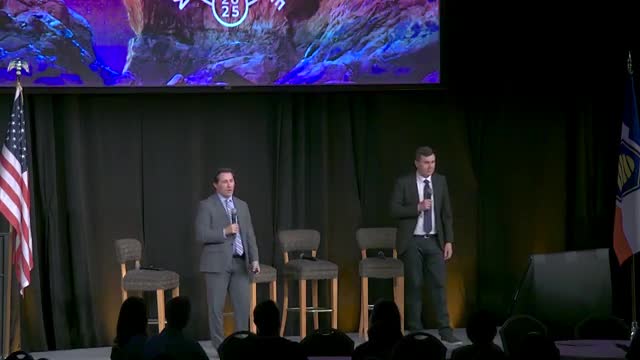Utah League: Legislature filed nearly 1,000 bills; cities face heavier workload, League urges member engagement
Get AI-powered insights, summaries, and transcripts
Subscribe
Summary
The Utah League of Cities and Towns reported 959 bills introduced this session, 1,110 substitutes and amendments adopted, and 582 bills passed, and announced new tracking and engagement practices to help cities respond.
Justin Lee, deputy director of the Utah League of Cities and Towns, told attendees that the most recent state legislative session produced a surge in legislation that will increase the workload for city governments. "959 bills introduced. 134 more bills than prior 9 year average," Lee said, and added that lawmakers adopted "1,110 substitutes and amendments." The League said it tracked 279 bills this year and recorded 582 bills that passed the session.
The numbers, the League said, create more drafting and review work for local governments. "Unfortunately this is a trend not an anomaly," Carson Eilers, the League's policy director, said, describing a steady increase in both the number of bills and the number of changes made to bills during the session. Eilers said the rise in substitutes and late amendments means League staff and city officials must read through many revisions to spot changes that could affect local codes or authority.
To manage the volume, the League described changes in its internal process and member engagement tools. It said the Legislative Policy Committee (LPC) took a variety of official positions this year: 34 bills supported, 26 opposed, 56 neutral and 161 listed as "monitor" — a new position the League placed into its bylaws to flag bills that warrant tracking without heavy advocacy. The League said it took "no position" on a fluoride bill because membership opinion was split, and left one item marked "position pending" after it effectively disappeared from consideration.
League staff outlined how they gather member input and act quickly when substitutes appear. The League said it used Slido polling and Qualtrics micro-surveys to collect rapid feedback, and insurance of that input can influence the League’s stance and legislative strategy. Lee described the League’s daily and nightly communications: a daily update list the League said has 3,486 subscribers and an average open rate of 51 percent (about 1,700 readers opening the daily email), plus nightly emails and a morning briefing used to prioritize which bills to escalate. "For us to be able to say, 'Hey, everybody. Take a look at this. Give us your feedback within 45 minutes before a committee,' it is an indispensable tool," Eilers said.
The League gave one policy example from the session: HB 198, which staff described as the billboard bill. League staff said they used multiple engagement mechanisms and member polling to test relocation mechanisms and find compromise language that members could "live with." The League also described its presence at committee meetings and on the floor, noting that committee debate is where much of the substantive discussion happens and that floor consideration often moves quickly.
The presentation also highlighted the resources the League offers members during session: scheduled officer check-ins with the governor's office, the LPC’s Monday meetings, morning briefings for immediate coordination, and staff coverage of committee hearings and floor votes. Staff said they coordinate who will speak with legislators and provide coaching for members who want to testify in committee.
Separately, League staff noted a public safety employment survey they maintain across multiple years: the League said it has accumulated 214,000 data points on public safety employment trends and will distribute its most recent analysis to members via Friday Facts and on its website.
League presenters closed by urging municipal officials to stay engaged during the interim. Lee said the volume of bills means the League cannot fight every unfavorable proposal and must prioritize where to expend time and credibility. The presentation concluded with the League turning the program over to a subsequent panel led by Molly (last name not specified in the transcript).
